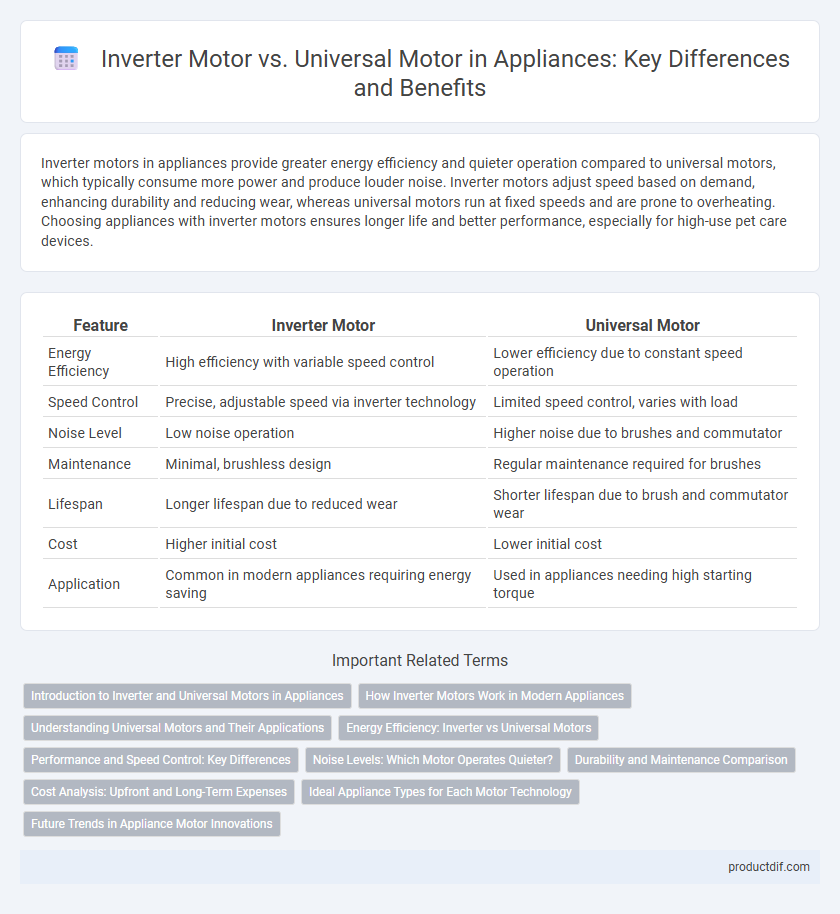Inverter motors in appliances provide greater energy efficiency and quieter operation compared to universal motors, which typically consume more power and produce louder noise. Inverter motors adjust speed based on demand, enhancing durability and reducing wear, whereas universal motors run at fixed speeds and are prone to overheating. Choosing appliances with inverter motors ensures longer life and better performance, especially for high-use pet care devices.
Table of Comparison
| Feature | Inverter Motor | Universal Motor |
|---|---|---|
| Energy Efficiency | High efficiency with variable speed control | Lower efficiency due to constant speed operation |
| Speed Control | Precise, adjustable speed via inverter technology | Limited speed control, varies with load |
| Noise Level | Low noise operation | Higher noise due to brushes and commutator |
| Maintenance | Minimal, brushless design | Regular maintenance required for brushes |
| Lifespan | Longer lifespan due to reduced wear | Shorter lifespan due to brush and commutator wear |
| Cost | Higher initial cost | Lower initial cost |
| Application | Common in modern appliances requiring energy saving | Used in appliances needing high starting torque |
Introduction to Inverter and Universal Motors in Appliances
Inverter motors in appliances utilize variable frequency drives to optimize energy efficiency and reduce noise by adjusting the motor speed based on demand. Universal motors, commonly found in portable appliances, operate at high speeds using AC or DC power but are less efficient and noisier than inverter motors. The adoption of inverter technology significantly enhances appliance performance and longevity compared to traditional universal motors.
How Inverter Motors Work in Modern Appliances
Inverter motors in modern appliances operate by converting direct current (DC) into variable frequency alternating current (AC), allowing precise control of motor speed and torque for enhanced energy efficiency and quieter operation. Unlike universal motors that run at fixed speeds and rely on brushes, inverter motors use electronic controls to adjust power output, improving performance and durability. This technology is commonly found in washing machines, refrigerators, and air conditioners, where variable speed control maximizes functionality and reduces power consumption.
Understanding Universal Motors and Their Applications
Universal motors operate on both AC and DC power, making them highly versatile for various household appliances. They are characterized by high starting torque and compact size, ideal for devices like vacuum cleaners, power tools, and kitchen mixers. Despite higher noise and maintenance compared to inverter motors, universal motors excel in applications requiring variable speed and portability.
Energy Efficiency: Inverter vs Universal Motors
Inverter motors significantly enhance energy efficiency by adjusting speed and power consumption based on the appliance's demand, reducing electricity use compared to universal motors that run at a constant speed regardless of load. Universal motors consume more energy and generate more heat due to their fixed speed operation, leading to lower overall efficiency in household appliances. Energy savings with inverter motors can reach up to 30-50%, making them ideal for modern energy-conscious appliance designs.
Performance and Speed Control: Key Differences
Inverter motors provide precise speed control and energy efficiency by using variable frequency drives, resulting in smoother operation and reduced noise levels. Universal motors deliver high starting torque and can operate at variable speeds but tend to be noisier and less efficient due to their brushed design. Performance-wise, inverter motors excel in applications requiring consistent speed and quiet operation, while universal motors are suited for high-torque, variable-speed demands at a lower cost.
Noise Levels: Which Motor Operates Quieter?
Inverter motors operate significantly quieter than universal motors due to their electronic commutation and smoother speed control, reducing mechanical noise and vibrations. Universal motors, commonly found in traditional appliances, produce louder sounds because of their brush and commutator design, which generates friction and electrical sparking. Noise levels in inverter motor appliances often measure below 50 decibels, making them ideal for noise-sensitive environments.
Durability and Maintenance Comparison
Inverter motors offer superior durability due to their brushless design, reducing wear and extending lifespan compared to universal motors that rely on brushes prone to friction and damage. Maintenance for inverter motors is minimal, as fewer moving parts and no brushes decrease service frequency and associated costs. Universal motors require regular brush replacements and more frequent inspections, resulting in higher maintenance demands and shorter operational life.
Cost Analysis: Upfront and Long-Term Expenses
Inverter motors typically have a higher upfront cost due to advanced technology and electronic components, but they offer significant energy savings and reduced maintenance expenses over time, making them more cost-effective in the long run. Universal motors feature lower initial purchase prices but tend to consume more electricity and require more frequent repairs or replacements, which increases total operating costs. For appliances like washing machines and vacuum cleaners, the choice between inverter and universal motors impacts both the initial investment and ongoing utility bills, with inverter motors proving economically advantageous over the product lifespan.
Ideal Appliance Types for Each Motor Technology
Inverter motors are ideal for appliances requiring high energy efficiency and quiet operation, such as refrigerators, washing machines, and air conditioners, due to their variable speed control and reduced power consumption. Universal motors, known for high-speed performance and compact size, are best suited for portable tools and small household appliances like vacuum cleaners and blenders where torque and speed are more critical than energy efficiency. Choosing the right motor depends on balancing factors such as noise level, speed control, power usage, and application-specific requirements.
Future Trends in Appliance Motor Innovations
Inverter motors offer superior energy efficiency and precise speed control compared to traditional universal motors, driving innovations in appliance performance and sustainability. Future trends emphasize the integration of smart sensors and IoT connectivity with inverter motors to enable predictive maintenance and customized operation. Emerging materials and advanced electronics further enhance inverter motor durability and noise reduction, positioning them as the preferred choice for next-generation home appliances.
Inverter motor vs Universal motor Infographic

 productdif.com
productdif.com